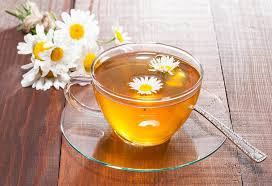It’s normal to feel anxious about moving to a new place, starting a new job, or
taking a test. This type of anxiety is unpleasant, but it may motivate you to work
harder and to do a better job. Ordinary anxiety is a feeling that comes and goes,
but does not interfere with your everyday life.
This type of anxiety may cause you to stop doing things you enjoy. In extreme
cases, it may prevent you from entering an elevator, crossing the street, or even
leaving your home. If left untreated, the anxiety will keep getting worse.
Anxiety disorders are the most common form of emotional disorder and can
affect anyone at any age. According to the American Psychiatric Association,
women are more likely than men to be diagnosed with an anxiety disorder.
1. Chamomile Tea
Chamomile tea is known for having soothing properties that can induce
relaxation.
There are two types of chamomile plant used to make chamomile tea: German
chamomile and Roman chamomile. Both types of chamomile tea can help you
distress and lower cortisol levels.
Compounds in chamomile tea inhibit the production of serotonin–the stress
hormone. In fact, a randomized double-blind study conducted by Ph.D.
researchers found that chamomile extract helped to significantly reduce anxiety
when taken daily for a period of eight weeks (2).
2. Meditation
Meditation can help to slow racing thoughts, making it easier to manage stress
and anxiety. A wide range of meditation styles, including mindfulness and
meditation during yoga, may help.
3. Exercise
One of the best things you can do for your mind and body is to get regular
exercise. Exercise releases endorphins—also known as happy hormones.
Accomplishing a hard workout can also boost self-confidence and make you feel
good about your efforts. Exercise functions as an outlet for you to work off your
aggressions and frustrations in a healthy way. Try to do activities that increase
your heart rate. Things like running, swimming, rowing, and hiking can all help
ease anxiety levels and reduce stress.
4. Writing
Finding a way to express anxiety can make it feel more manageable.
Some research suggests that journaling and other forms of writing can help
people to cope better with anxiety.
A 2016 study, for example, found that creative writing may help children and
teens to manage anxiety.
5.Lemon balm infusion
Lemon balm induces a relaxed state of mind, easing tension and lifting the
spirits. Avoid with hypothyroidism.
Method: Infuse 1–2 tsp dried lemon balm in 175ml (6fl oz) boiling water and
drink 3 times daily.
6. Lower sugar and processed food intake:
Sugar and refined carbohydrates found in processed foods can create sugar highs
and lows throughout the day, which can lead to symptoms of anxiety. These
foods can also cause mood swings and altered energy levels, making it
potentially harder to gain control of anxiety symptoms. Foods such as cookies,
pastries, soda, fast foods, fried foods, processed meat, and refined grains may
best be avoided when it comes to easing anxiety.
7. Take a hot bath with Epsom salts
Why: A soothing hot bath is always calming, and raising your body heat may
help regulate mood and anxiety. For added benefits, stir in some Epsom salts.
The magnesium sulfate in the salts has been shown to calm anxiety and lower
blood pressure. You can also try adding lavender or vanilla essential oils to your
bathwater, to reap the benefits of these calming scents.
8. Avoid Disastrous Thoughts
scenario. When something goes wrong, they start feeling like disaster is about to
strike and think of the worst possible outcomes. If you feel disastrous thoughts
coming on, take a minute to do some breathing exercises or go for a short five-
minute jog. Try to focus your thoughts on positive outcomes and don’t let
yourself become overwhelmed by negative potentials.












0 Comments